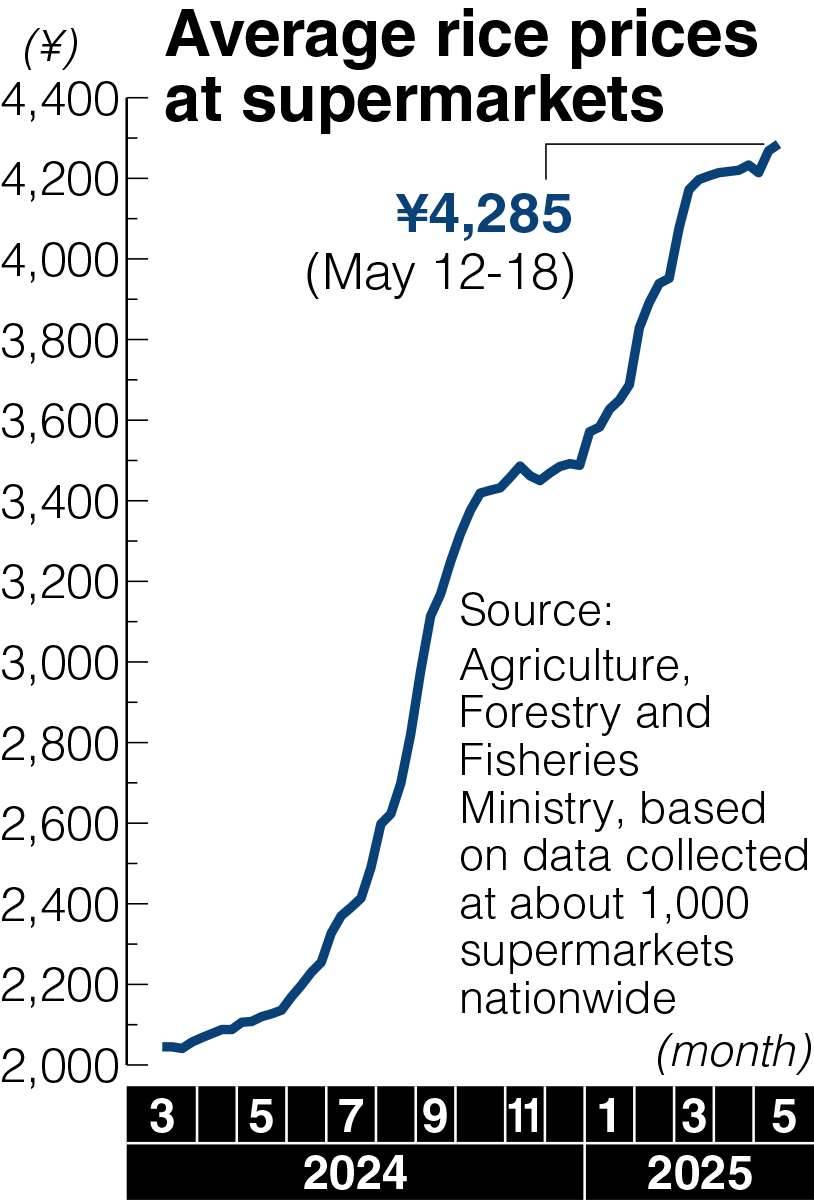May 28, 2025
TOKYO – The agriculture ministry’s decision to sell state-held reserves of rice through “discretionary contracts,” in which the government sets the price of the grain, is a drastic change from its previous stance of not controlling rice prices. With the average price of rice now doubled from the same period last year — reaching more than ¥4,000 for 5 kilograms at supermarkets — much attention is being paid to whether the ministry’s new approach will be effective.
“We will prevent rice prices from rising further, halt the decline in rice consumption and fulfill our responsibility,” Agriculture, Forestry and Fisheries Minister Shinjiro Koizumi told ministry officials on Monday. He also set up a special in-house team to tackle rising rice prices.
The standard system of open bidding played a role in driving rice prices higher, as those who made the highest bid would win the auction. Under a discretionary contract, the government can set a low price and decide who gets a contract. This approach also reduces intermediary margins by skipping distributors and wholesalers, which also helps lower prices.

GRAPHICS: THE YOMIURI SHIMBUN
According to a ministry survey, 90% of the about 210,000 tons of rice sold at auction in March was bought by the National Federation of Agricultural Cooperative Associations (Zen-Noh). Only 14,998 tons, or 7.1%, had gone to retailers, as of April 27. The key element of Koizumi’s new measure is how much faster it can enable distribution through direct sales to retailers.
The ministry started accepting applications for the discretionary contracts on Monday. A senior official of Pan Pacific International Holdings Corp., which runs discount store chain Don Quijote, told reporters on Monday after he participated in a ministry briefing that the company would apply that day. Pan Pacific International Holdings may limit the amount of rice each consumer can buy and will start selling the rice as soon as possible, the official said.
“It’s beneficial for consumers if we retailers participate in the discretionary contracts. We’ll make efforts to put the price at the ¥2,000 level,” the official said.
Rakuten Group, Inc. is considering direct sales through its Rakuten Ichiba e-commerce site. The company hopes to start selling the rice in early June in cooperation with Japan Post Holdings Co., which is Rakuten’s partner in the distribution business.
Hiroshi Mikitani, chairman and president of Rakuten Group, met with Koizumi on Friday and reportedly told the minister that he would make efforts to sell stockpiled rice.
Ito Yokado Co., which is under the umbrella of Seven & i Holdings Co., is one of the major retailers expected to apply for a contract. Aeon Co. is also considering submitting an application.
Rice has to be polished before being sold at stores, and retailers will have to perform this task.
“We have to prepare bags for polished rice and rice polishing facilities. The schedule will be tight,” said an official in charge of public relations for a major retailer. It may take them longer to put rice in stores if they have to arrange for other companies to polish the rice.
If the stockpiled rice is distributed from June as Koizumi expects, the average sales price at supermarkets may go down nationwide. Currently, the price is more than ¥4,000 per 5 kilograms, about double the level in the same period last year. If stockpiled rice costing about ¥2,000 appears in stores, Prime Minister Shigeru Ishiba’s hopes for an average price at the ¥3,000 level may be realized.
However, the total amount of stockpiled rice sold at the three open biddings and to be sold through the discretionary contracts is about 610,000 tons in total, or less than 10% of the 7 million tons needed annually. It will last households only two months.
Cheap rice sold through discretionary contracts may be popular among consumers. If it goes out of stock, expensive rice distributed through open bidding will remain at stores.
“The current extraordinary high prices will subside when sufficient rice comes into the market,” said Shunsuke Orikasa, chief researcher at the Distribution Economics Institute of Japan and a specialist in rice distribution.
However, Orikasa is skeptical about the long- and mid-term effects of the measure. “There’s no way that retailers and wholesalers will sell rice at a lower price than they paid to buy it,” he said.


